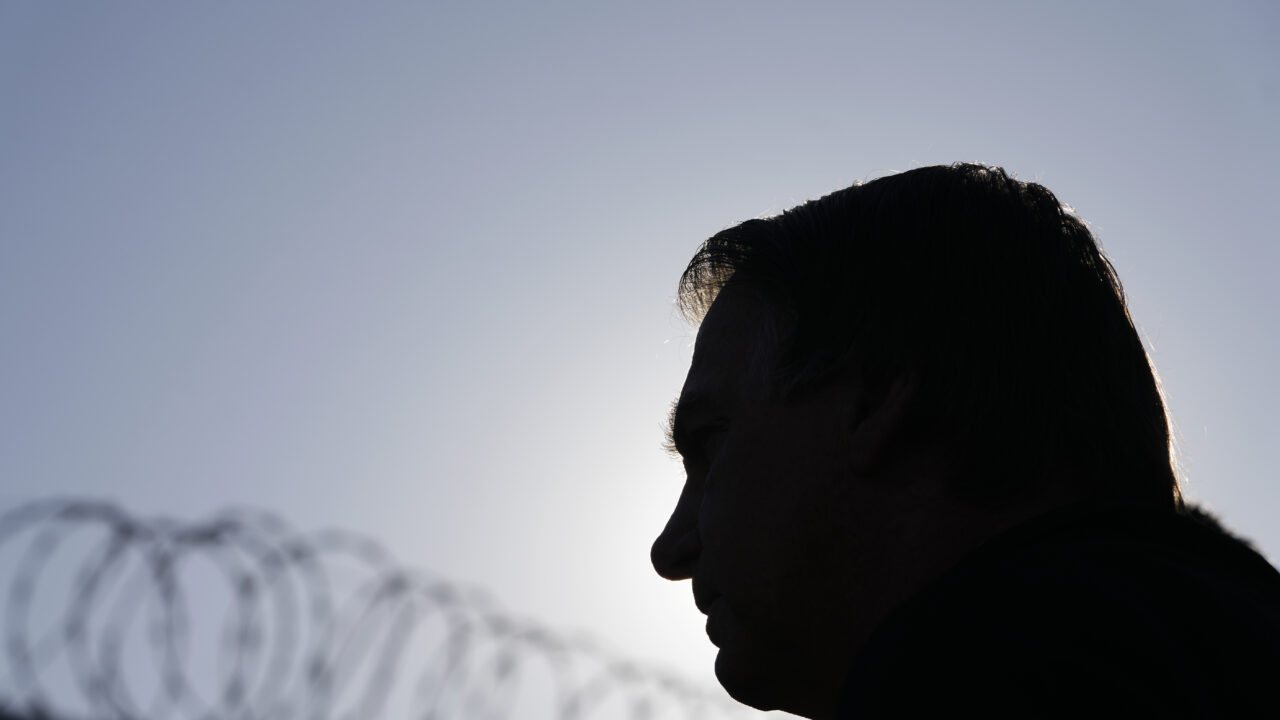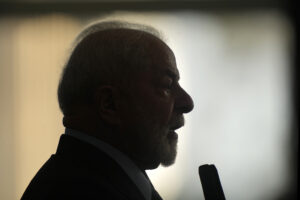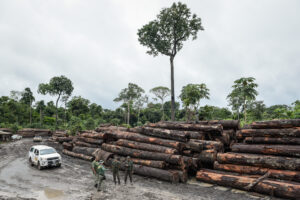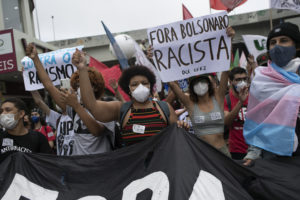Brazil’s Congress: Bolsonaro Accountable for January 8 Mob
The special commission analyzed the events that led to the attack a week after Luiz Inácio “Lula” da Silva's inauguration. In a silhouette, Brazil's former President Jair Bolsonaro speaks to the media upon arrival to the airport in Brasilia, Brazil, Thursday, June 29, 2023. (AP Photo/Eraldo Peres)
In a silhouette, Brazil's former President Jair Bolsonaro speaks to the media upon arrival to the airport in Brasilia, Brazil, Thursday, June 29, 2023. (AP Photo/Eraldo Peres)
On January 8, 2023, a week after newly elected Luiz Inácio “Lula” da Silva walked on the Planalto presidential palace ramp and was inaugurated as president for a third term, Brazilians watched in shock as a mob attacked and broke into federal power buildings, including the Supreme Court and the National Congress, in Brasília, contesting the elections result.
Almost ten months after the events, this October 18, a group of parliamentarians approved a report naming former president Jair Bolsonaro and 60 other people as accountable for the events that led to the attacks in what they call a ”wilful coup attempt.”
The 1.333-page report is a product of almost five months of hearings in an investigation commission compiled by members of the federal Senate and the Lower Chamber. It was approved with 20 votes in favor and 11 against.
Besides Bolsonaro, the report names five former ministers and eight Armed Forces generals for attempting a coup with the invasion of the three powers headquarters. As reported by Agência Brasil, the document asks for Bolsonaro to be indicted for criminal association, attempting violent abolition of the democratic state and to depose a democratically elected government.
Senator Eliziane Gama, the rapporteur, also named the far-right former president as the ”intellectual author” of the events, saying in ”possible partial conclusions”:
His social media presence is marked with swearwords and debauchery, articulating hate, ignorance and mediocrity, in a way that reverberates with the lowest feelings of a people devastated by economical and social crisis. In the elections, this digital strategy deepened its reach and enhanced its method, having him and his entire family a robust audience in different medias, as demonstrated by Ana Júlia de Paiva Gennari’s research.
This modus operandi was named Hate Cabinet, through which a structured network disseminated misinformation, hate, attacks to the ballots, to the left (or what they identified as being from such ideology, but not always accordingly to political science manuals) and to democratic institutions.
Experts heard by the newspaper The Guardian said they are doubtful the report “will have immediate legal consequences for the former president and his allies” and is ”politically symbolic rather than crucial to any future prosecution.” Charges and further actions depend now on the attorney general’s analysis.
When the attacks occurred, Bolsonaro was in the United States, where he travelled before Lula’s inauguration to avoid being present at the ceremony. Lula was visiting places affected by floods and heavy rains in the state of São Paulo, only returning to Brasília later that day.
Bolsonaristas politicians, as the former presidents’ supporters are known, were the ones who insisted on the installment of the commission as a strategy to pinpoint the responsibility for a failure to avoid the attacks on the current government, which seemingly backfired.
Report’s findings
The report traces a timeline of how speeches and a digital ecosystem helped to set up an environment that led to the radicalization of part of the population, ending up in the attacks on January 8.
It approaches the democracy crisis, explains the threats and the rhetoric adopted by bolsonaristas, the set up of digital militias and robots, the role of Big Tech companies, how security forces were co-opted and politicized in the period, the attacks made to the electoral system that led to people to resist accepting the results of the election, camping in protest for months and their radicalization.
Besides Bolsonaro, the report names five former ministers and eight Armed Forces generals for attempting a coup with the invasion of the three powers headquarters.
In June 2023, a ruling of the Superior Electoral Court (TSE) ruled Bolsonaro ineligible for eight years, meaning he can’t run for any positions in this period. The reason was a live broadcast meeting, where he invited foreign ambassadors based in Brazil to showcase the electoral system as not trustworthy, only months prior to the elections. He failed to present any evidence of such.
Near January 8, days before the storming into the public buildings in Brasília, as the report shows, there was a call out through messaging apps and social media for a ”Selma’s party,” a pun with the Portuguese word ”selva” (jungle), a battle-cry used by the military.
Despite the comparisons to the Capitol invasion in Washington, United States, on January 6, 2021, after Donald Trump’s defeat, the reports says that ”Selma’s party” actually worked as a plan B inspired by the protests in Sri Lanka that led to president Gotabaya Rajapaksa resignation in 2022.
Based on messages that were shared in bolsonaristas groups, the report says their idea was to hold a siege in Brasília, leading to chaos and a general strike between January 9 and 12. There were also calls to military officers and to people with gun license to attend.
Some messages exchanged by the protesters and featured in the report showed Brazil actually came to the brink of such chaos. As Alexandre de Moraes, the Supreme Court justice who presides over the investigation of these events, said while ruling about one of the people arrested for the January 8 attacks: it wasn’t a Sunday ride in the park.
The report quotes one message saying:
The foresight was of violence ahead. ”This is the idea: we are not supposed to go and be all peace and love, no. We’re getting in, not with flower…We’re going already aware that we might get rubber and some shots.”
Until October 27, 20 people had been sentenced by the Supreme Court for involvement in actions linked to the January 8 attack. They were charged with armed criminal association, violent abolition of the democratic state, coup-d’état, and damaging federal patrimony, with sentences between three and 17 years.
Bolsonaristas’ take
If the report written by Senator Eliziane Gama hadn’t been approved, the commission could analyze separate votes presented by other members. One by Senator Izalci Lucas, with 2.500 pages, and another with 348 pages signed by 16 parliamentarians, according to the Senate news service. They asked for Lula and his government members to be held accountable for not acting to prevent the attacks.
In a session a day before the approval, Senator Lucas affirmed that ”the federal government could have avoided all that happened.”
Senator Magno Malta, an evangelical pastor and Bolsonaro ally, said:
The rappourter’s report, by Senator Eliziane Gama, is much more a fantasy than an official document. Many people exposed, lives ruined, much narrative, all to hit just one man: Jair Messias Bolsonaro. We, the opposition, are presenting this report, because it sets the truth straight. The true story of January 8 will be told.
Another senator, Flávio Bolsonaro, the former president’s eldest son, claimed:
Lula’s leniency had a fundamental contribution to allow the invasion and destruction of public patrimony. If he had acted in accordance to the framework of legal attributions, not leaving the city and imposing, without quibble, the protection of public federal buildings, specially the Planalto Palace, certainly the invasions wouldn’t have occurred or the damages would be minimal.
After the report was approved, a man who worked for a Bolsonarista Congress member harassed and criticized Senators Gama and Soraya Thronicke, a former Bolsonaro ally and presidential candidate who is now critical of him, following and filming them. He was later fired.
Your support matters…Independent journalism is under threat and overshadowed by heavily funded mainstream media.
You can help level the playing field. Become a member.
Your tax-deductible contribution keeps us digging beneath the headlines to give you thought-provoking, investigative reporting and analysis that unearths what's really happening- without compromise.
Give today to support our courageous, independent journalists.






You need to be a supporter to comment.
There are currently no responses to this article.
Be the first to respond.